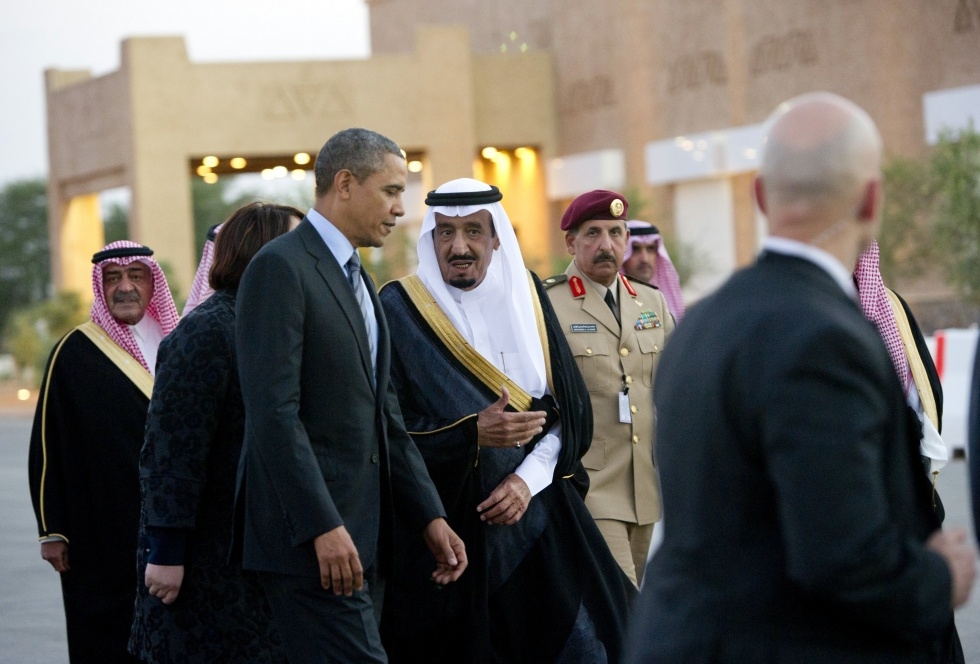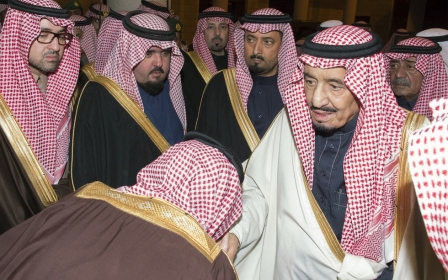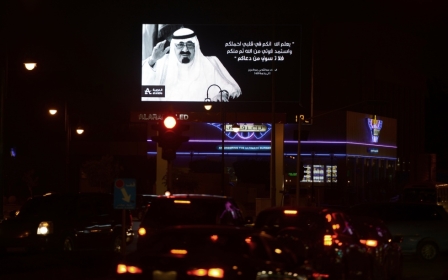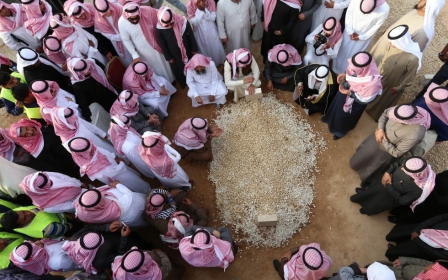Obama in Riyadh to pay respects to people of Saudi Arabia

US President Barack Obama will lead a high-level delegation of officials to Riyadh on Tuesday, for a brief visit to express condolences to King Salman after the death of his predecessor Abdullah.
Secretary of State John Kerry, CIA director John Brennan and head of US Central Command General Lloyd Austin III will all travel with the American president to Saudi Arabia. They will be joined by Republican colleagues John McCain, the 2008 presidential candidate, and former secretaries of state James Baker III and Condoleezza Rice.
Saudi Arabia announced Friday King Abdullah bin Abdulaziz al-Saud had died in hospital after a short illness. He was believed to be in his early 90s and has been replaced on the throne by his half brother and crown prince Salman bin Abdulaziz.
The US delegation is due to spend just four hours in the Saudi capital and will hold a meeting and dinner with the new leadership, according to the New York Times, who reported it was rare for the American president to make an overseas trip when a country’s leader dies.
A senior US official said the visit will be an opportunity for Obama – who said he had a “genuine and warm friendship” with Abdullah - “to pay respects to the family and to the people of Saudi Arabia.”
“They will touch on some of the leading issues where we cooperate very closely with Saudi Arabia,” said Ben Rhodes, the White House deputy national security advisor.
He said the fight against the Islamic State group and the current turmoil in Yemen will be major topics of discussion.
While the visit will be an opportunity for American officials to meet King Salman, talks will likely include new deputy crown prince and interior minister Mohammed bin Nayef, who visited Washington in December for a series of high level meetings.
The 55-year-old bin Nayef is second in line to the throne, after Crown Prince Muqrin bin Abdulaziz, and is viewed as a key player in the new Saudi leadership – in part due to rumours King Salman is suffering from an early onset of Alzheimer’s disease.
“Salman is not really able to do the day-to-day job of being king – not just because of his Alzheimer’s but also due to his age – he’s 79,” Ali al-Ahmed, a Saudi opposition figure and director of the Washington-based Gulf Institute, told MEE.
“[Crown Prince] Muqrin has very little power. Now the most effective leader is Mohammed bin Nayef.”
Sadness, joy at Abdullah’s death
Abdullah's death last week was followed by a public outpouring of grief in the ultra-conservative Gulf state with thousands descending on the late King's palace to show their respects and other expressing their continued support for the royal family on Twitter by pledging allegiance to King Salman.
“I have pledged my allegiance through Twitter because as we progress technologically, we do not abandon our identity and traditions,” Twitter user Salman al-Otaibi told AFP. “This pledge is a duty on every Muslim.”
However, while little dissent is tolerated in Saudi Arabia, some have used the hashtag for the new king to express their joy at the demise of the late Abdullah.
The account @almonaseron, which advocates for the release of political prisoners in the central Qassim province, has shared a number of tweets said to show people celebrating Abdullah’s death with “feasts”.
Translation: The popular celebrations of joy at the #DemiseofKingAbdullahBinAbdulaziz for his crimes against Muslims. #KingSalmanBinAbdulaziz (the cake says: We congratulate the Muslim nation on the destruction of the tyrant)
Translation: Celebration at the Public Prison at the #DemiseofKingAbdullahBinAbdulaziz for his crimes. #PowerIsNotTheRightOfTheAlSauds #KingSalmanBinAbdulAziz
Translation: Families made a banquet in celebration at the #DemiseOfKingAbdullahBinAbdulAziz the tyrant. #KingSalmanBinAbdulAziz
Qassim province has seen prolonged unrest over the alleged detention without charge of political prisoners. Sporadic protests by relatives of the prisoners have ended in clashes with riot police, although demonstrations have petered out in recent months.
The number of political prisoners in Saudi Arabia is unknown but activists have estimated there to be tens of thousands detained. Those held include figures from across the political spectrum – from liberal bloggers to Islamists.
In Qassim, a province known for its traditional healers and camel rearers, many of the prisoners have been detained for their alleged support of jihad – both at home in Saudi Arabia and abroad in conflict zones including Syria and Iraq.
Middle East Eye propose une couverture et une analyse indépendantes et incomparables du Moyen-Orient, de l’Afrique du Nord et d’autres régions du monde. Pour en savoir plus sur la reprise de ce contenu et les frais qui s’appliquent, veuillez remplir ce formulaire [en anglais]. Pour en savoir plus sur MEE, cliquez ici [en anglais].




